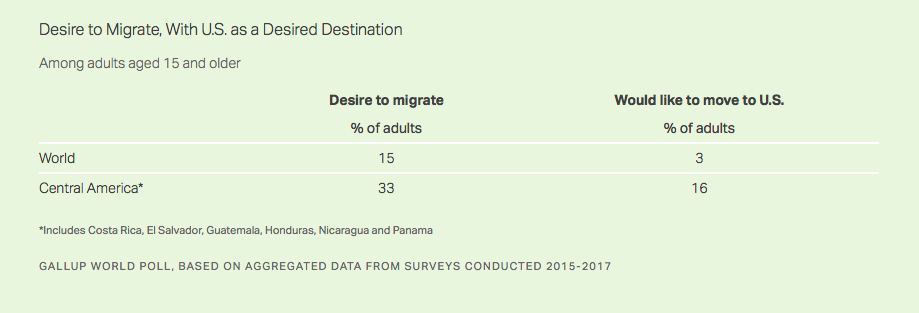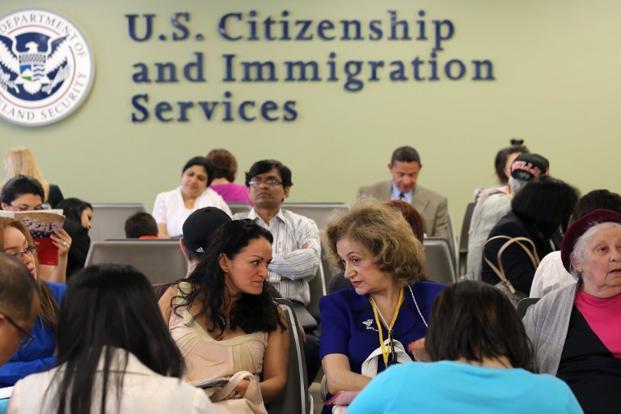Since President Donald Trump took office in 2016, political rhetoric coming from the White House has painted migrants as threats to the U.S. economy, claiming that they steal jobs, lower wages and act as an overall economic net drain on domestic resources.
While many of these claims remain baseless, experts believe they are now negatively impacting the economy as both high-skilled and low-skilled migrants are being discouraged from coming to the U.S.
“[That immigrants cost U.S. taxpayers billions of dollars] is a talking point that is provided to the president by people who don’t have any information on the subject,” Michael Clemens, co-director of migration, displacement, and humanitarian policy at the Center for Global Development said on November 2. “We get nowhere, and we certainly don’t get any useful innovation from starting with talking points based on disinformation.”
Disproving these talking points are a variety of statistics showing that the economic impacts from migrants are almost the opposite, and are, in fact, very much in the U.S. national interest.
In 2016, the International Monetary Fund found that within advanced economies like the U.S., migrants increase GDP per person and help improve economic productivity by providing skills that are complementary to those of native workers.
A study conducted by the National Academy of Sciences, Engineering and Medicine in 2017 also found that the llong-termnet present value (NPV) for each new immigrant that comes to the U.S. is $259,000. This means that each individual will ultimately contribute that much money to national economy over the scope of their lifetime.
In addition to these long-term NPV additions and GDP increases, migrants contribute to the U.S. economy in three primary ways: As consumers, and as participants in high-skilled and low-skilled labor positions.
As consumers, migrants contribute billions of dollars annually through domestic spending, particularly in the realms of higher education from international student tuition fees and in international tourism.
“Fundamental workers are consumers,” Clemens said. “They consume goods and services made by U.S. natives and therefore expand the opportunities for investment and specialization by U.S. natives who work with each other.”
High-skilled migrants provide critical contributions to the U.S. labor force as well, especially considering that they are just as likely to possess a college or advanced degree as the U.S.-born population, and are therefore able to boost innovation and entrepreneurship in areas like STEM.
Multiple industries and geographical areas within the U.S. are particularly dependent on low-skilled migrant influxes, especially as labor markets throughout the country have become more polarized, creating job vacancies that Americans aren’t filling.
The U.S. Dairy Industry exemplifies one of these sectors that are incredibly reliant on immigrant labor, both legal and illegal.
With 51 percent of all dairy labor coming from immigrants, and 79 percent of the U.S. milk supply coming from dairies that utilize immigrant labor, research conducted by Texas A&M professors shows that “the permanent loss of significant portions or all immigrant labor would have major negative economic impacts.”

The city of Detroit represents a testimony to the positive impacts that migrants can add to communities as well.
Steve Tobocman is the director of Global Detroit, an organization that attempts to make the southeast Michigan region more welcoming to immigrants and to “capitalize on the economic opportunities” that international populations bring to the U.S., according to its website.
Over the last decade, rapid growth coming mainly from Yemeni and Bengali immigrants has helped the city rebuild from bankruptcy and population loss that plagued the region between 2000 to 2010.
“What has helped stem the level of population loss has been a rapidly growing immigrant population,” Tobocman told The Globe Post. “They have made a significant difference in a number of Detroit neighborhoods where they are moving in to distressed, low-income areas and providing new housing consumers, new retail consumers, often opening new retail stores and breathing new life into a handful of Detroit neighborhoods.”
Tobocman said the contributions of both high and low skilled migrants are prominent in Michigan, exemplified by high migrant representation among tech-firm leadership, as well as a large migrant presence within agricultural and service industries that “enable Michigan companies to prosper.”
Considering these assets that migrants add to the U.S. economy, experts agree that ongoing hostile rhetoric and legal barriers disallowing them to enter the country could have severe future consequences.
According to Tobocman and research that Global Detroit has done on the subject, Trump’s rhetoric “has already had a very negative impact on the economy,” citing declines in population growth, international student enrollment rates and a downturn in international tourism in the state since Trump took office as evidence of the president’s impact.
For Clemens, Trump’s rhetoric and “war against legal migration” has created a climate where it is easy for populist politicians to convince Americans that migrants are to blame for their problems, drawing attention away from the productive roles they play within the U.S. economy and potentially contributing to future economic devastation.
“It is reasonable to expect that this all out assault on lawful immigration to the U.S., which is very likely to or already has substantially decreased migration and is likely to decrease it even more over the years to come, is going to harm the U.S. economy and harm it for a very long time,” Clemens said.
Right-Wing Radicals a Higher Threat to US than Undocumented Immigrants Ever Were






















